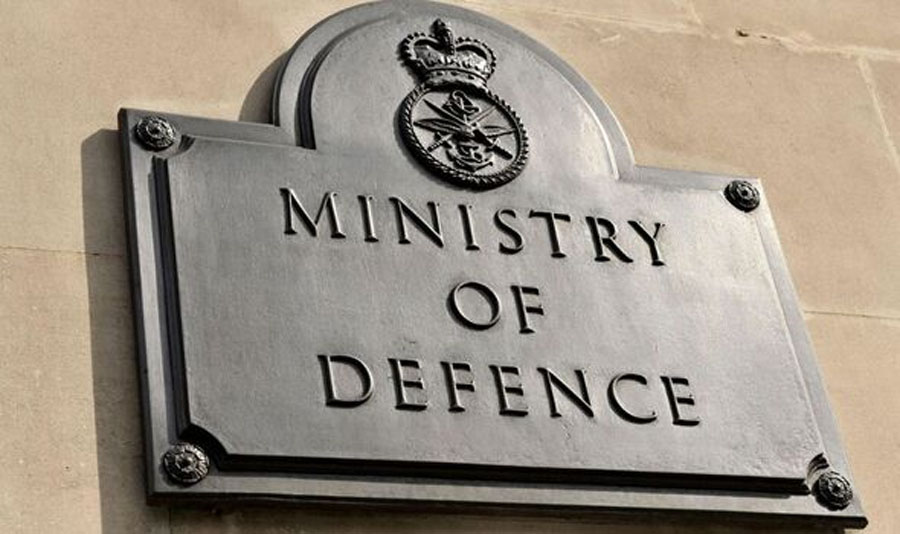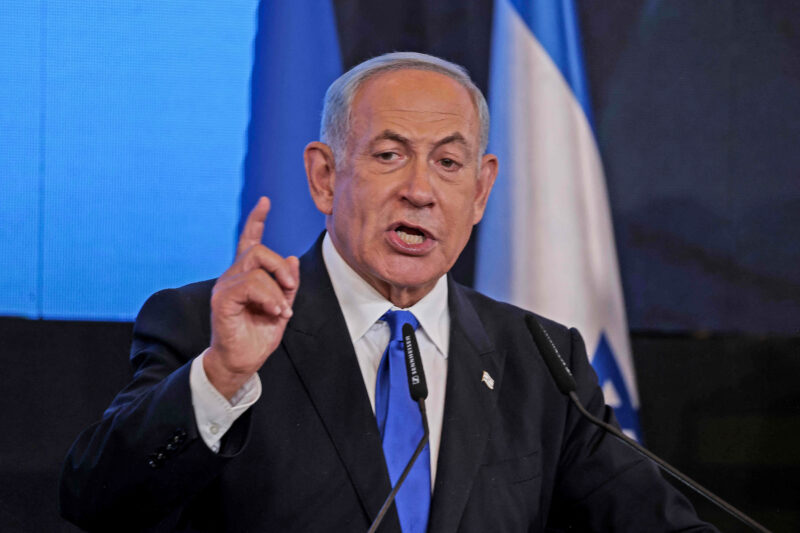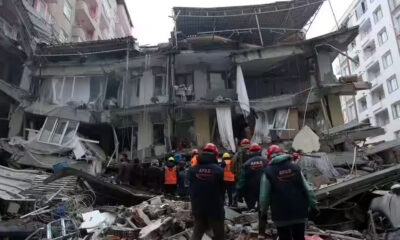International
Taiwan quake leaves four dead, scores injured

Taiwan quake leaves four dead, scores injured
At least four persons were feared dead and nearly 60 were injured on Wednesday by a powerful earthquake in Taiwan that damaged dozens of buildings and prompted tsunami warnings that extended to Japan and the Philippines before being lifted.
Officials said the quake and series of strong aftershocks were the strongest to shake the island in decades and warned of more tremors in the days ahead.
“The earthquake is close to land and it’s shallow. It’s felt all over Taiwan and offshore islands,” said the director of Taipei’s Central Weather Administration’s Seismology Centre, Wu Chien-fu.
Strict building regulations and disaster awareness appear to have staved off a major catastrophe for the island, which is regularly hit by earthquakes as it lies near the junction of two tectonic plates.
Wu said the quake was the strongest since one of 7.6-magnitude struck in September 1999, killing around 2,400 people in the deadliest natural disaster in the island’s history.
Wednesday’s magnitude-7.4 quake struck just before 8:00 a.m. local time (0000 GMT), with the United States Geological Survey putting the epicentre 18 kilometres (11 miles) south of Taiwan’s Hualien City, at a depth of 34.8 kilometres.
“I wanted to run out, but I wasn’t dressed. That was so strong,” said Kelvin Hwang, a guest at a hotel in the capital, Taipei, who sought shelter in the lift lobby on the ninth floor.
Social media was awash with shared videos and images from around the country of buildings swaying as the quake struck.
READ ALSO:
- Two million Almajiri enrolled in schools within six months – FG
- Again, JAMB extends DE registration by two weeks
- JUST IN: Five feared killed, many injured as security forces exchange fire with gunmen in Anambra
Dramatic images were shown on local TV of multi-storey structures in Hualien and elsewhere leaning over after it ended.
Roads to Hualien, a mountain-ringed coastal city of around 100,000 people were reported blocked by landslides.
The Central Emergency Operations Center said one person on a hiking trail was suspected to have been crushed to death by a dislodged boulder, adding nearly 60 people had been treated for quake-related injuries.
In Taiwan, Japan and the Philippines, authorities initially issued a tsunami warning but by around 10 am (0200 GMT), the Pacific Tsunami Warning Center said the threat had “largely passed”.
In the capital, the metro briefly stopped running but resumed within an hour, while residents received warnings from their local borough chiefs to check for any gas leaks.
Taiwan is regularly hit by earthquakes as the island lies near the junction of two tectonic plates, while nearby Japan experiences around 1,500 jolts every year.
Across the Taiwan Strait, social media users in China’s eastern province of Fujian, which borders the southern province of Guangdong, and elsewhere said they also felt strong tremors.
China, which sees self-ruled Taiwan as a renegade province, was “paying close attention” to the quake and “willing to provide disaster relief assistance,” state news agency Xinhua said.
The vast majority of quakes around the area are mild, although the damage they cause varies according to the depth of the epicentre below the Earth’s surface and its location.
The severity of tsunamis — vast and potentially destructive series of waves that can move at hundreds of kilometres per hour — also depends on multiple factors.
Japan’s biggest earthquake on record was a massive 9.0-magnitude undersea jolt in March 2011 off Japan’s northeast coast, which triggered a tsunami that left around 18,500 people dead or missing.
The 2011 catastrophe also sent three reactors into meltdown at the Fukushima nuclear plant, causing Japan’s worst post-war disaster and the most serious nuclear accident since Chernobyl.
Japan saw a major quake on New Year’s Day this year when a 7.5-magnitude tremor hit the Noto Peninsula and killed more than 230 people, many of them when older buildings collapsed.
Taiwan quake leaves four dead, scores injured
International
Chinese state linked to hacking of UK Defence Ministry

Chinese state linked to hacking of UK Defence Ministry
Sky News has learned of a significant data breach at the Ministry of Defence (MoD), with indications pointing towards state-sponsored hacking by China. The breach targeted service personnel, prompting concerns about national security and individual safety.
According to sources, the cyberattack, allegedly orchestrated by the Chinese state, targeted the MoD’s payroll system, compromising the personal information, including names and bank details, of both current service personnel and veterans. While all salaries for this month will be disbursed as planned, the breach raises serious concerns about the vulnerability of sensitive government systems.
Conservative MP Tobias Ellwood, a former soldier, expressed suspicions that China may exploit the financial vulnerability of affected individuals for coercive purposes. Defence Secretary Grant Shapps is expected to address the issue in Parliament, outlining measures to safeguard affected personnel and mitigate future risks.
READ ALSO:
- Terrorists attack Southern Kaduna again, kill six, injure eight
- Court rules against wife who sued husband for forced ‘unnatural sex’
- Netanyahu rubbishes Hamas ceasefire proposal
The MoD has moved swiftly to investigate the breach, assuring that no data appears to have been extracted thus far. However, the incident underscores the evolving nature of cyber threats and the imperative of bolstering national defenses in the digital realm.
The breach comes amid escalating tensions between the UK and China, with recent accusations of cyber aggression attributed to “state-affiliated actors.” Labour’s shadow defence secretary, John Healey, has called for a comprehensive response from the government, emphasizing the gravity of the breach and its implications for national security.
Conservative MP Sir Iain Duncan Smith echoed concerns about China’s systemic threat, calling for a recalibration of UK policy in response to Beijing’s hostile activities. The incident underscores the need for heightened vigilance and investment in cybersecurity infrastructure, as advanced warfare increasingly extends into the digital domain.
Chinese state linked to hacking of UK Defence Ministry
International
Court rules against wife who sued husband for forced ‘unnatural sex’

Court rules against wife who sued husband for forced ‘unnatural sex’
An Indian judge has dismissed the complaint of a woman who claimed that her husband committed “unnatural sex,”.
The judge said it is not illegal for a husband to force his wife to engage in sexual acts under the Indian law.
The ruling, made in the Madhya Pradesh High Court last week, highlighted a legal loophole in India that doesn’t criminalise marital rape by a husband against his wife if she’s over age 18, CNN reports.
The woman told police her husband came to her house in 2019, soon after they were married, and committed “unnatural sex,” under Section 377 of India’s penal code, according to the Madhya Pradesh High Court order.
The offence includes non-consensual “carnal intercourse against the order of nature with any man, woman or animal,” and was historically used to prosecute same-sex couples who engaged in consensual sex before the Supreme Court decriminalized homosexuality in 2018
The woman also alleged the act happened “on multiple occasions,” and that her husband had threatened to divorce her if she told anyone about it. She finally came forward after telling her mother, who encouraged her to file a complaint in 2022, the court heard.
Meanwhile, the husband challenged his wife’s complaint with his lawyer claiming that any “unnatural sex” between the couple was not criminal as they were married.
READ ALSO:
- Netanyahu rubbishes Hamas ceasefire proposal
- Nigerian varsity VC suspended over alleged gross misconduct
- Lagos to experience morning, afternoon thunderstorms for 3 days
Delivering his judgement, Justice Gurpal Singh Ahluwalia stressed India’s marital rape exemption, which does not make it a crime for a man to force sex on his wife, a relic of British rule more than 70 years after independence.
“When rape includes insertion of penis in the mouth, urethra or anus of a woman and if that act is committed with his wife, not below the age of fifteen years, then the consent of the wife becomes immaterial … Marital rape has not been recognized so far,” the judge said.
India’s Supreme Court increased marital consent from the age of 15 to 18 in a landmark judgment in 2017.
The woman also accused her in-laws of mental and physical harassment “on account of non-fulfilment of demand of dowry,” the court order said. A trial is pending.
Ahluwalia’s remarks have once again raised questions over India’s treatment of women, who continue to face the threat of violence and discrimination in the deeply patriarchal society.
The world’s largest democracy of 1.4 billion has made significant strides in enacting laws to better safeguard women, but lawyers and campaigners say its reluctance to criminalize marital rape leaves women without adequate protection.
According to the 2019-2021 National Family Health Survey by the Government of India, 17.6% of more than 100,000 women ages 15-49 surveyed said they were unable to say no to their husband if they didn’t want sex, while 11% thought husbands were justified in hitting or beating his wife if she refused.
READ ALSO:
- Your position on state police unacceptable, Lagos Assembly tells IGP
- Fubara blasts Rivers lawmakers: You only exist because I recognise you
- Two men land in Ibadan court for allegedly stealing two loaves of bread
Women alleging rape in India have some avenues of potential legal action against their husbands.
For example, they can seek a restraining order under civil law or charges under Section 354 of India’s Penal Code, which covers sexual assault short of rape, and Section 498A, which covers domestic violence.
These laws are open to interpretation and judges can use them to impose prison sentences for sexual assault in cases where a married woman has alleged rape, but many don’t, lawyer Karuna Nundy previously told CNN.
Many married women are also ignored when they try to file a police complaint, a 2022 study showed.
The study examined records from three Mumbai public hospitals from 2008 to 2017 and found that of 1,664 rape survivors, no rape cases were filed by police. At least 18 of those women reported marital rape to the police, including 10 women who alleged rape by a former partner or husband.
Four women were explicitly told by police that they could not do anything as marital rape was not a crime, the report said.
Over the years, Campaigners have been trying to change the law but said they’re up against conservatives who argue that state interference could destroy the tradition of marriage in India.
Court rules against wife who sued husband for forced ‘unnatural sex’
International
Netanyahu rubbishes Hamas ceasefire proposal

Netanyahu rubbishes Hamas ceasefire proposal
Israeli Prime Minister Benjamin Netanyahu has rejected a proposed Gaza ceasefire, deeming it “far from Israel’s basic requirements,” despite Hamas accepting the terms presented by Qatari and Egyptian mediators.
In response to Hamas’s acceptance of the truce terms, Netanyahu stated that negotiations would persist but emphasized that Israel’s military operations near the Rafah border crossing in southern Gaza would continue. Israeli forces and tanks were reportedly observed in the vicinity following overnight airstrikes on Rafah.
Tensions escalated as Israel issued evacuation warnings to Palestinians in eastern Rafah. Thousands sought refuge amid fears of an impending offensive against Hamas hold-outs.
Netanyahu’s office declared Israel’s intent to pursue negotiations while maintaining military pressure on Hamas. The Israeli war cabinet resolved to advance war objectives, including the release of Israeli hostages and the neutralization of Hamas’s military capabilities.
READ ALSO:
- Nigerian varsity VC suspended over alleged gross misconduct
- Lagos to experience morning, afternoon thunderstorms for 3 days
- Your position on state police unacceptable, Lagos Assembly tells IGP
Hamas had signaled willingness to cease “hostile activity forever” as part of a two-phase ceasefire deal brokered by Qatar, Egypt, and the United States. The proposed agreement outlined the release of Israeli hostages and the gradual dismantling of Israeli military infrastructure within Gaza.
The United States, engaged in brokering the deal alongside Qatar and Egypt, is currently reviewing Hamas’s response.
The conflict, which began with Hamas incursions into southern Israel, has resulted in significant casualties. Both parties remain entrenched in their positions, with the prospect of a lasting ceasefire hanging in the balance.
Netanyahu rubbishes Hamas ceasefire proposal
-

 Sports2 days ago
Sports2 days agoRonaldo’s hat-trick leads Al Nassr to 6-0 victory over Al Wehda
-

 International2 days ago
International2 days agoGaza: Thousands rally for hostage deal as ceasefire talks continue
-

 Entertainment2 days ago
Entertainment2 days agoNollywood veteran Shan George weeps as fraudster clears ₦3.6m from her account (VIDEO)
-

 News3 days ago
News3 days agoDon’t host US, French military bases in Nigeria, northern leaders warn Tinubu
-

 metro2 days ago
metro2 days agoDSS seals Plateau clinic over patient’s death
-

 News3 days ago
News3 days agoUpdated: NNPC blames fuel scarcity on panic buying, hoarding, marketers disagree
-

 metro3 days ago
metro3 days agoEx-FCMB manager sentenced to 121-year imprisonment
-

 Politics2 days ago
Politics2 days agoPDP: Sule Lamido blames court for mass resignation from party






















